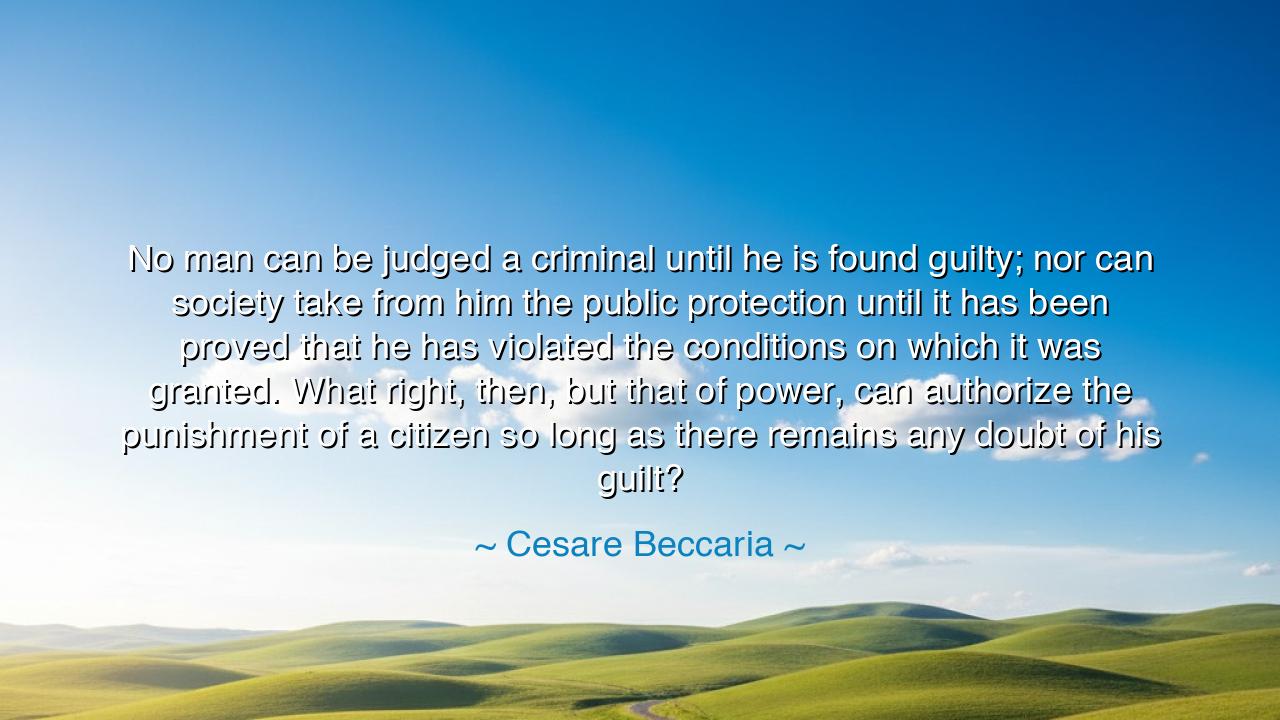
No man can be judged a criminal until he is found guilty; nor can
No man can be judged a criminal until he is found guilty; nor can society take from him the public protection until it has been proved that he has violated the conditions on which it was granted. What right, then, but that of power, can authorize the punishment of a citizen so long as there remains any doubt of his guilt?






Hear the words of Cesare Beccaria, the great voice of the Enlightenment, who in his treatise On Crimes and Punishments dared to challenge the cruelties of his age: “No man can be judged a criminal until he is found guilty; nor can society take from him the public protection until it has been proved that he has violated the conditions on which it was granted. What right, then, but that of power, can authorize the punishment of a citizen so long as there remains any doubt of his guilt?” These words were not cast into the air lightly. They were a cry for justice in a time when men were broken on the wheel, tortured for confessions, and condemned by suspicion rather than truth. Beccaria spoke as a prophet against the tyranny of power unrestrained, demanding that reason, not vengeance, be the law’s foundation.
The ancients knew well the dangers of unchecked authority. In Rome, the principle cuique suum tribuere—to render to each his due—was the heart of justice. Yet even Rome often failed, condemning men in haste or by rumor, as in the trials under Tiberius, when accusation alone was treated as guilt. Beccaria, centuries later, restored the ancient demand for fairness: that no citizen should be stripped of protection until the truth has been proven beyond doubt. To punish without proof is not justice, but tyranny cloaked in law.
Consider the history of the Salem witch trials. In the late seventeenth century, women and men were accused of witchcraft not by evidence, but by suspicion and hysteria. Children’s words condemned their neighbors; spectral visions became accepted as proof. Many were executed while doubt hung heavy in the air. This madness revealed the peril of punishing without certainty, and Beccaria’s question strikes at its heart: what right, save brute power, can justify such punishment when guilt remains uncertain?
Beccaria’s words shook Europe in an age of torture chambers and secret tribunals. He declared that confession won by pain was worthless, that doubt should acquit rather than condemn, and that society itself was guilty when it punished the innocent. His influence spread like fire: rulers, philosophers, and reformers embraced his ideas. Even the framers of the American Constitution, writing a century later, echoed his wisdom in the presumption of innocence, in the right to a fair trial, and in protections against cruel punishment.
O listener, see the wisdom: a society that punishes without proof becomes a beast devouring its own children. The protection of the law must extend even to the accused, for without that shield, all men are vulnerable to false charge and the whims of power. If doubt remains, the law must pause; for better to release the guilty than to condemn the innocent. Such is the true strength of a just people—that they restrain their anger until truth is made certain.
Let your spirit burn with vigilance. Do not be swept by passion when accusations rise. Ask always: Has guilt been proven? Has evidence been weighed with fairness? Has the accused been granted his rightful defense? For in these questions lies the safeguard of liberty. Without them, justice collapses, and what remains is not law, but oppression dressed in its garments.
In practice, guard the rights of the accused as jealously as your own. Defend due process, demand fairness in judgment, and resist the temptation to condemn by rumor or suspicion. Teach others that justice is not vengeance, and that patience in proof is the highest form of strength. Support institutions that hold to the principle of innocence until guilt is proven, for in their firmness lies the foundation of freedom.
So I say unto you: remember Beccaria’s cry. No man is a criminal until he is found guilty; no punishment is just until guilt is proven without doubt. A society that forgets this truth loses not only its justice, but its very soul. Choose always the harder path of fairness, for in that path lies the endurance of liberty, and in liberty, the hope of a better world.






AAdministratorAdministrator
Welcome, honored guests. Please leave a comment, we will respond soon